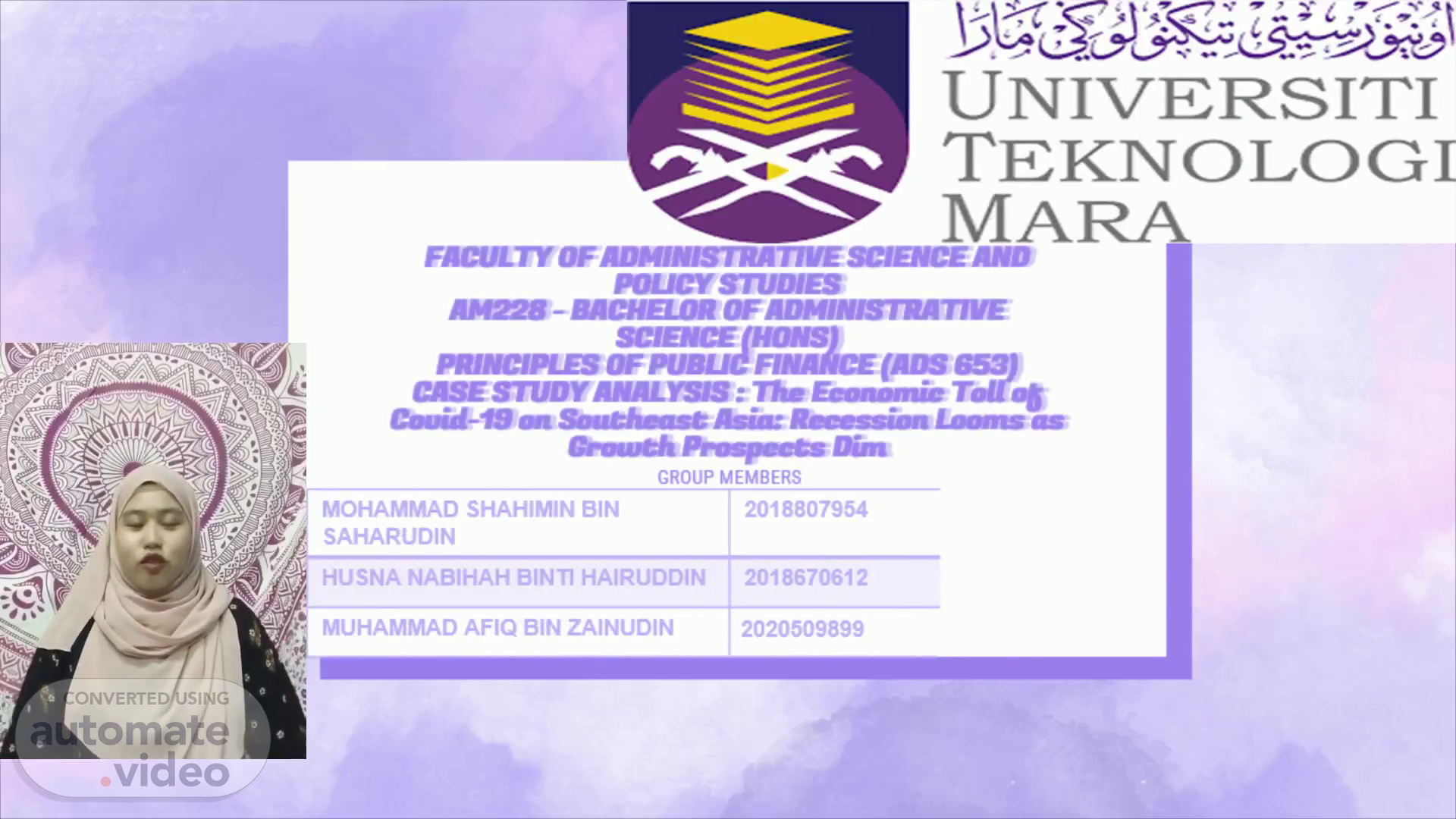
FACULTY OF ADMINISTRATIVE SCIENCE AND POLICY STUDIES AM228 - BACHELOR OF ADMINISTRATIVE SCIENCE (HONS) PRINCIPLES OF PUBLIC FINANCE (ADS 653) CASE STUDY ANALYSIS : The Economic Toll of Covid-19 on Southeast Asia: Recession Looms as Growth Prospects Dim
Scene 1 (0s)
VHVVN IOOFION>1au ILISHaAINIÄ. FACULTY OF ADMINISTRATIVE SCIENCE AND POLICY STUDIES AM228 - BACHELOR OF ADMINISTRATIVE SCIENCE (HONS) PRINCIPLES OF PUBLIC FINANCE (ADS 653) CASE STUDY ANALYSIS : The Economic Toll of Covid-19 on Southeast Asia: Recession Looms as Growth Prospects Dim.
Scene 2 (40s)
SUMMARY OF CASE STUDY. The covid-19 has cause a huge impact for Southeast Asian economies on the global economic crisis. ASEAN-5 (Indonesia, Malaysia, Philippines, Thailand, and Vietnam) will expand at a rate of -0.6 percent in 2020. The major emerging ASEAN countries are expected to expand at rate of 0.5 percent to -5.0 percent . Many of these Southeast Asian countries are affected by their particular economic structures, owing to their early economic situations prior to the crisis . Thailand is likely to be the greatest hit in 2021, as they are already struggling due to other economic challenges. Almost the same can be said about Indonesia and the Philippines..
Scene 3 (3m 7s)
Malaysia is expected to revive strongly , but Singapore's economic activity may be slowed slightly. Vietnam is predicted to retain moderate growth in 2020. Consumption represents about 60 percent of GDP in the major ASEAN economies, and falls in consumption will have large impact on these economies . This pandemic may benefit a few countries in Southeast Asia, as the demand for mobile monitoring and other digital solutions to combat virus outbreaks grows, allowing these few countries to benefit as a result..
Scene 4 (4m 47s)
This study aims to present the reactions of travellers during a pandemic by analysing text messages sent in the event of a global pandemic, COVID-19 . ASEAN economies are expected to experience a sharp slowdown or recession in all of the ASEAN economies in 2020. Southeast Asian countries made different policy decisions in response to the pandemic at the onset of crisis, more recently, there has been a more united regional response . Despite the worldwide economic crisis brought on by the Covid-19 outbreak in Europe, officials in the Eurozone see the crisis as a relatively short-term phenomenon . The number of confirmed cases in the region is still rising, but at a slower pace than before..
Scene 5 (6m 7s)
The rapid spread of the virus in China led to the disruption of supply chains and freezing demand limiting the flows of travel, trade and investment into and out of the country . ASEAN members agree that counter-measure restrictions on cross-border movements should be based on public health considerations, and should not unnecessarily restrict trade within the region. They also agree to address non-tariff barriers , particularly those that impede the smooth flow of goods and services in supply chains . Efforts to contain and respond to future outbreaks of the Ebola virus could benefit Southeast Asian economies. A global or regional shift in demand toward digital applications, government policies designed to support this sector could also benefit the region's economies as we get out of this global crisis..
Scene 6 (7m 25s)
Q2 : DISCUSS THE GLOBAL ECONOMIC IMPACT OF COVID-19 PANDEMIC.
Scene 7 (8m 23s)
The strengthening of foreign currency was supported by the entry of investors into foreign countries. Uncertainties such as the tense situation between the US and China may cause the foreign exchange rate to be hampered . The repercussions of the virus crisis have an impact on supply and demand, as well as causing FDI market shocks. Food production was harmed. Tourism is critical to the development of a robust global economy. The global tourist industry has shrunk by 5 times compared to 2009, when the world was in the grip of the financial crisis . The UN must play a role in strengthening the global economy as well as increasing health spending..
Scene 8 (11m 5s)
CONCLUSION. Each country in Southeast Asia is likely to see a varied impact, depending on the country's current position. Many countries are expected to struggle economically in 2020, as many economic operations have been halted or slowed down. Others are predicted to make a stronger comeback or recovery in 2021..
Scene 9 (12m 7s)
THANK YOU.